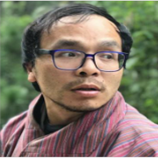
Nedup Dorji is a Lecturer at the College of Natural Resources, The Royal University of Bhutan in 2007. In 2008, he was awarded for the Thai International Cooperation Agency to pursue a MSc in Agriculture at Khon Kaen University, Thailand (graduated in 2010). During his MSc, he assessed genetic variations of Bhutanese indigenous chickens, and compared with Thai native chickens and commercial chicken lines. In 2016, Nedup was awarded the Netherlands University Foundation for International Cooperation in Higher Education to pursue a PhD study at the Farm Technology group in collaboration with the Animal Production Systems group of Wageningen University. His study focused on transhumant yak farming in Bhutan. Currently, he is the Managing editor and editorial board member of the Bhutan Journal of Natural Resources and Development (BJNRD) and till date he has been working as the Lecturer at the College of Natural Resources, The Royal University of Bhutan.
Transhumant Pastoralism in a Changing World: Challenges and Opportunities to Sustainable Yak farming in Bhutan
Nedup Dorji 1 *,Marjolein Derks 2 , Peter W.G. Groot Koerkamp 2 and Eddie A.M. Bokkers 3
In the high altitude of Bhutan, yak farming is the main livelihood of transhumant pastoralists living 2500 m above sea level. However, yak farming is under pressures because of external factors such as socioeconomic developments, policies and climate change. Little is known about the impact of these factors on yak farming, and what policies and interventions might be required to sustain yak farming under these pressures. Therefore, the aim of this study was to assess the impact of external factors and management on yak farming in Bhutan, with a focus on past developments, the current situation and future perspectives in yak farming. Overall, increasing yak predation by predators, decreasing forage availability in the rangelands, and decreasing number of successors are the major threats to yak farming, while the market to sell yak products is the least threat. The factors causing forage shortage are specific to certain regions, e.g. competition with the horse population (west), cordyceps collection (central and west) and prohibited burning of shrubs around rangelands (east and central). Although concerns around yak farming have increased over the years due to external factors, most herders (82%) wish their children to continue yak farming in the future. Nonetheless, over half of the herders (58%) and most livestock professionals (96%) think that the number of yak farming families will decline in the future. To get insight into how different stakeholders perceive the challenges and opportunities related to yak farming, six focus group interviews were organised with different stakeholders (herders and representatives of governmental bodies). Most problems and solutions identified in the focus group interviews differed between the stakeholder groups. This suggests a need for a multi-stakeholder dialogue aiming to discuss problems and solutions together with different stakeholders. The government should streamline socioeconomic development by supporting and improving basic facilities in yak farming villages (e.g. better access to communication, animal health services), pay attention to human-wildlife conflicts and forage shortage, and explore sustainable income based on yak farming.
